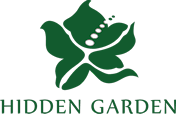As a student herbalist learning my craft, I’m always excited to venture out into the world and gain valuable field experiences. I’ve travelled and explored herbal gardens and habitats locally, within the United States, and abroad. I recently had the opportunity to travel to Freeport, Grand Bahamas to conduct field research on the ground as part of my Maryland University of Integrative Health internship. Prior to Freeport, I spent time in Guatemala with a host family learning about herbalism and Mayan culture. These trips have taught me valuable cultural and interpersonal lessons in etiquette and professionalism.
Some of you reading my blog post are experienced herbal field researchers –this information is probably not new to you! Kindly remember that each one of our experiences is uniquely different. Gathering and disseminating information while allowing a forum for open discourse is what we do. If you are a new student to herbalism and/or new to herbal field research, I hope you will find some pearls of wisdom here, with some coming directly from my mentors and teachers. Now, let us travel down this educational road together…
Before you travel…
#1 – Respect the research and location
Knowing as much as you can before you go is critical to field research. Are you travelling to urban locations? Rural? Near the ocean? US? Abroad? Find out the weather for that time of year and if you need to have enough local currency with you (i.e., no ATMs). I’ve collected maps and walking guides for both local and foreign travel. If you travel alone, you really want to have an itinerary of your trip and provide that same itinerary to at least one person close to you. Your itinerary should include any emergency information, a copy of your travel information, travel guide with recommendations for lodging and restaurants, and health insurance information. You want to already have some of your activities planned (and possibly paid for) and any introductory conversations with tour guide companies and/or host tourism opportunities completed prior to arrival. Know the agreed upon rate and get written confirmation.
You also want to make sure that you are bringing the right gear and materials needed to maximize your herbal field research. I always travel with a foldable water bottle, lightweight pack to hold my camera and notebook, and great walking shoes. Lastly, it is helpful to read reviews from others but don’t let them guide your ultimate decision-making. I’ve been pleasantly surprised by places that received neutral reviews, but I also pay attention if I see reviews about safety and security as a central theme.
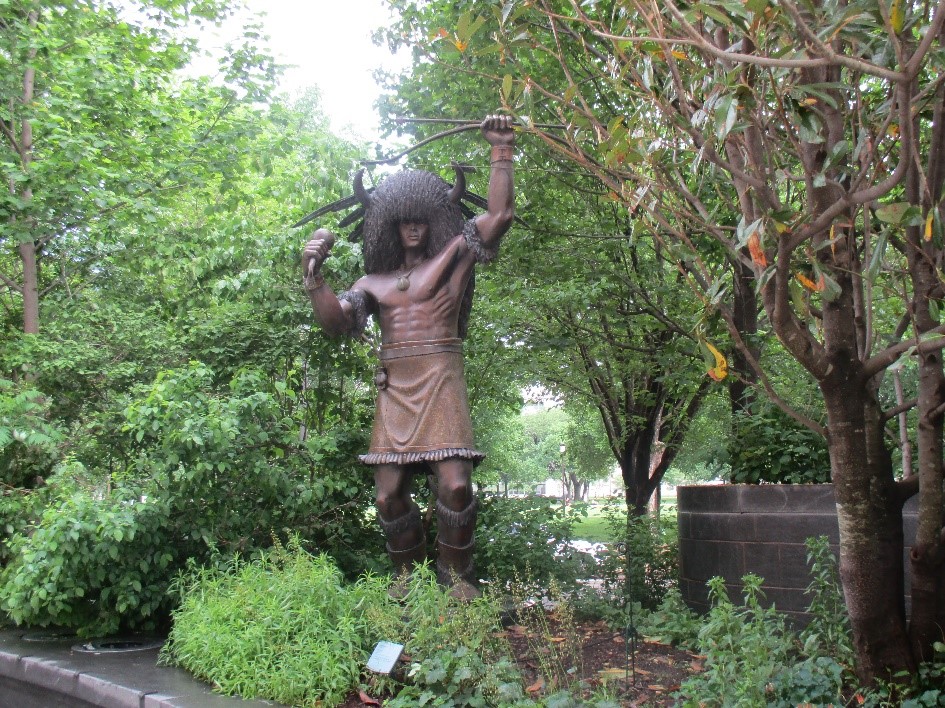
Sculpture located in the Native Landscape garden at the National Museum of the American Indian – Washington, D.C.
#2 – Gather as much background knowledge on the area/people/population prior to arriving
It is critical to know the economic, cultural, and economic norms. Know if your field research will lead you to impoverished areas or areas going through recovery due to a natural disaster. When travelling abroad, you also might want to let the State Department (and your bank) know where you are going and sign up for any text/email travel alerts. This advice also applies to regional travel and staying abreast of the news! I once visited the Smithsonian herb gardens with the intention of seeking quiet reflection. I did not watch any news that morning and George Washington University was graduating on the National Mall with thousands of people in attendance. I also did not do enough environmental research on Freeport prior to arriving on the island. I would have still travelled there but I did not know the area was still recovering from 2016 Hurricane Matthew. That experience did allow me to see (from the air) forest areas thriving with vegetation on one side of the road and complete devastation from Matthew’s path on the other side. Don’t assume you have all the information you need once the logistics are completed.
In the spirit of contextual learning, it is important to reinforce your preliminary research with the experiences of local residents and those with cultural knowledge and insight. It is always helpful to seek out books, YouTube videos, Facebook, and other documentation by residents and those within the culture you are researching. These resources will provide you with an overview of the location, environment, and culture. Always remember to be respectful of what you learn through these resources. Their culture and practices may be different from your own and you might even find varying points of view among residents and local elders. The key here is to gain as much background experience as you can so that you are prepared to observe and learn without judgement or bias.
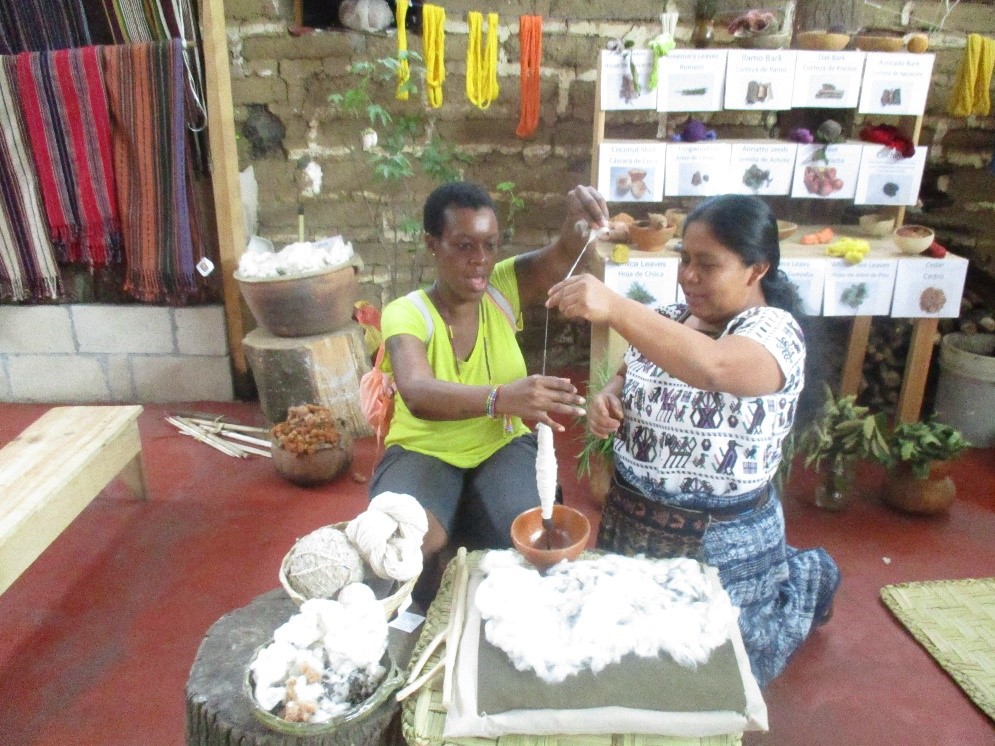
Stopping in Codeas Women’s Weaving Cooperative in San Juan La Laguna, Guatemala to learn a new skill and herb dyeing technique
#3 – When you plan for your expenses, factor in tips and/or offerings during your stay
Herbal field research is not like planning for a vacation and only tipping the bartender or waitress after the end of a meal. Field research is an experience and livelihood for the people you meet along the way. Guatemala was my first experience with ethno-tourism, and I can honestly admit that I did not plan for the extra tips and gratuities. While in Antigua, I found myself trying to find a bank or ATM at the end of day to access more cash to cover all the tips and offerings that resulted from my research. If I have to give new field researchers one piece of advice, it would be this –please plan on tipping and offering those that welcome you into their homes, shops, educational centers, gardens, etc. You will find that some will take an offering, but others may decline. The point is, they are sharing their herbal knowledge to you which might be generations worth of experience. Acknowledging their willingness to freely share their world is respectful of at least a 15% local currency tip or offering at the end of the experience.
Social Media Note: Some of my journeys have led me to people who are using Instagram, Facebook, Yelp, and TripAdvisor to increase their business and visibility. It is helpful to also post a review or lead your social media followers to their pages if you enjoyed your experiences while conducting research. I only had one experience in which I chose not to leave a review because I knew it was going to be slightly negative. Instead of blasting them on Airbnb, I chose to directly address the issue with the host. Again, my experience with them in that instance was purely personal and I did not want to be the reason why business declined for them. On the other hand, if you’ve experienced a situation that was very impactful I would suggest you have a conversation with your mentor or professor before posting a comment online.
#4 – Be prepared for variations in your research itinerary (and travel)
My partner can tell you that I learned this the hard way while travelling throughout the Bahamas. It had nothing to do with the field research at the time but more to do with getting home. Because I had budgeted the trip and the tips/offerings, I knew I had a slight cushion for unexpected things. On my departure from Freeport, I encountered very bad weather that was not forecasted prior to me leaving for my field research. A rainy day turned into a very bad storm leaving out of Florida heading towards the Caribbean. Not only was my departure flight delayed, we also circled the island until Nassau’s airport opened back up for arrivals. I missed my second flight due to the gate closing as well as the airline cancelling my third flight to D.C. I can say that I honestly freaked out for a few seconds. Once my partner calmed me down over the phone, I made the decision to reach out to the other airline companies before trying to find a hotel in Nassau. Luckily, the JetBlue counter had two American businessmen checking in for an outboard flight to Fort Lauderdale. I found two flights back to the DC area that were affordable. The moral of the story is to plan for unexpected changes in your itinerary along the way. Don’t travel with just enough to support you there and back. It is helpful to have a backup resource or person who can assist you when complications arise.
As a side note, don’t always depend on your cell phone and/or Wi-Fi while abroad. I’ve found that an internet connection can be spotty. The mobile messaging phone app ‘WhatsApp’ has been very valuable throughout my travels abroad whether for field research or regular travel. You might also want to consider renting a cell phone from your destination country depending on the length of your trip for an extra layer of security and piece of mind.
In the field…
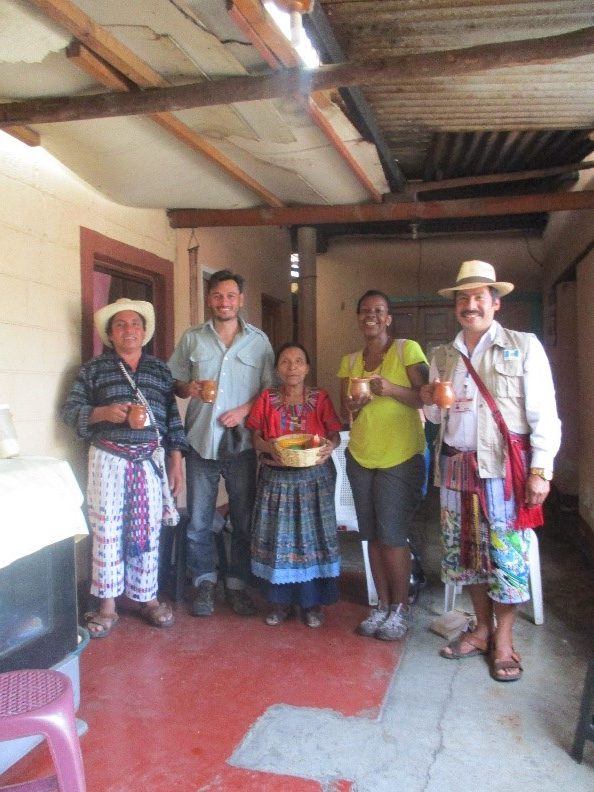
Enjoying my time in the Village of San Juan La Laguna while sampling herbal tea
#5 – Elders always deserve respect even when conversations and situations may be difficult
I had the pleasure of having two guides and a translator with me during my travels to Lake Atitlan & Village of San Juan La Laguna. It was a structured visit throughout the village with conversations including a bone healer and elder midwife. While touring some of the locations, certain rooms (i.e., bedrooms, herbal preparation rooms, children play areas) were restricted due to my presence as a guest in their homes and sanctuaries. The elders I meet always had generational experience that was disclosed in a very controlled way. You might find yourself having varied time to listen and ask questions. As much as you want to pack it in or wrap it up, elders require a certain level of compassion, mindfulness, and patience that is honored within their communities. If you find yourself entering into difficult conservations, language/translation problems, or situations where your visit is abruptly cut short due to an emergency within the community, please be patient. Mutually decide if the visit can be rescheduled or understand that the information you did receive was valuable and a blessing to receive from them directly.
#6 – It’s never about you! E.V.E.R.
I know you have only a set amount of time to ascertain all the data, pictures, and possible free time you can get before departure. Sometimes you have to leave early in the day and grind it out until sunset.
You’ve invested in gear, clothing, and the internship/tuition to be able to get to this point.
Unfortunately, it is still not about you. No need to rush your guides, elders, or teachers to provide all the answers you seek. Always be respectful! Some of you are probably reading this like – um Shayla we know that! The respectful part is easy but allowing yourself to walk away from field research not always getting the desired results is harder.
I will disclose something to you in the hopes that it might help you. I came into Freeport with my intended data and herbal questions pertaining to set topics on bush medicine, native African and Bahamian herbs, and the impact of the Atlantic slave trade on Bahamian descendants. Educational gems and pearls of wisdom came along the way, but the focus of most conversations was about the result of 2016 Hurricane Matthew on the island. The main casino on the island closed and unemployment on the island is around 21%. I realized on the first day that my whole intent of gathering certain types of information was not going to happen. Instead, I listened and learned about the herbs and formulations used to deal with conditions such as blindness, diabetes, acne, eczema, depression, erectile dysfunction, and fertility. I also heard about religious herb usage and the need for better jobs on the island to bring family members back to Freeport from Nassau. I humbly resigned myself to the fact that the information I gathered was never about my goals but about the people who so graciously shared a piece of themselves with me. I found a way to incorporate this new data into my research.
Hawksbill, Hunters, and Mack Town
#7 – Listen…and listen again…and listen again before talking
During my travels throughout Freeport, my bush medicine healer/tour guide spoke about the hardships that have resulted from Hurricane Matthew in 2016. His direct quote to the picture above was – Baby, someone still lives there! He went through the various settlements describing the ways in which people still live in their houses until all the hurricane renovations are completed. I had so many field questions to ask, yet most of our conversations had nothing to do with my list. However, it was a very rich and informative discussion that lead to why people turn to bush medicine healers and herbs. Sometimes the ‘why’ and ‘how’ is more important than your initial research goals. His economic, social, and cultural commentary about Freeport and the Bahamas was invaluable, and it gave him the opportunity to understand my passion for respectively learning his world and existence. As researchers, we are passing through and will return home after the field research is done. Listening is one of the most intrinsic skills you can bring to your research. Your professionalism will thank you for it!
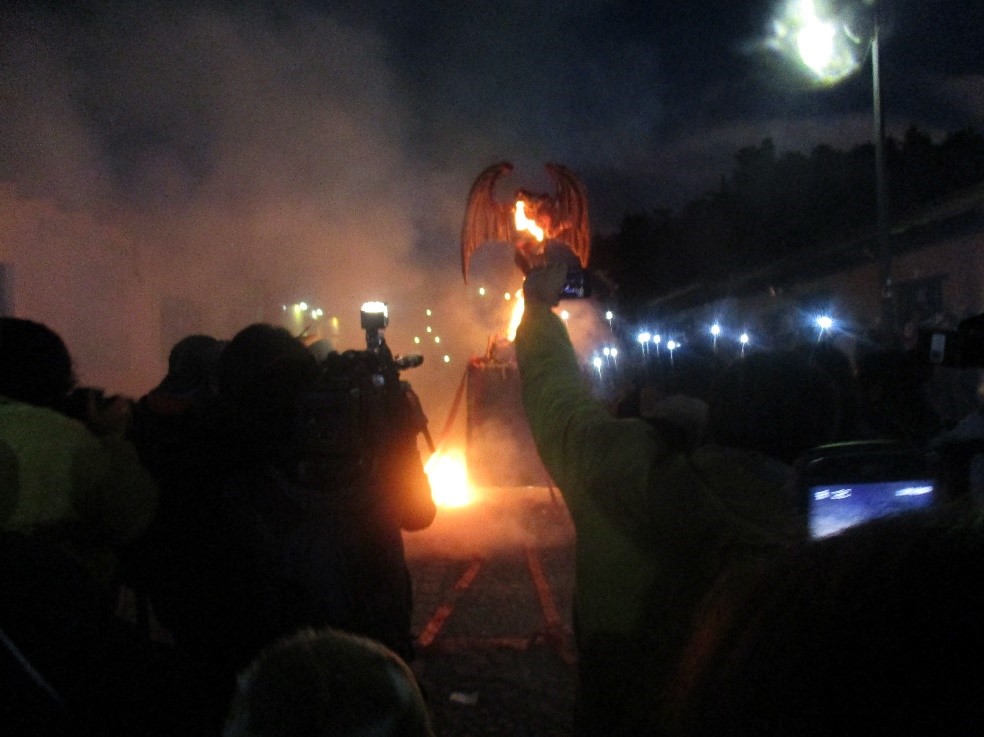
Burning of the Devil Ceremony in Antigua, Guatemala
#8 – Never miss an opportunity to spend outside field time with someone…Safety first of course!
To be honest, I don’t always like travelling alone but I am also an introvert. In spite of that, I’ve always taken the opportunity to attend outside activities with tour guides and healers that I meet in the field. Don’t be afraid to ask questions after receiving an invite and let others (either back home or on the ground) know where you are going at all times. This speaks back to tips #1, 2, and 4. If you can plan with a guide, they might have local events that will correspond with your stay and might even be willing to attend them with you. While in Guatemala, I attended the religious and cultural Burning of the Devil festivities with my host family and at night I got to sit in a local bar to sample mezcal (distilled agave). I would have never tried that on my own, but I was grateful for the experience. In Freeport, riding around visiting various settlements provided me with a foundation for understanding the socioeconomic concerns and wellness of the people firsthand. Safety always comes first when deciding to venture out and experience new adventures. I’ve never experienced hostel accommodations and comradery while abroad but it could also be a resource for you if needed.
#9 – Never take economic/cultural/social norms personally
News flash: I’m an African-American woman and mother from America with natural hair mainly travelling solo to enjoy her herbal field research. I mention that because I’ve encountered stares, commentary, sexual cat calls, higher price quotes, questions about American racism, Obama, Trump, police brutality, universal healthcare, inquiries about the source of my wealth, hair questions, etc.…
I never take any of it personal. It is very helpful to know the climate and norms of the location and country that you are about to enter. That being said, disrespect and/or criminal intent is never acceptable to me. I want to know my audience and environment beforehand. I have several female friends that have travelled throughout the Middle East and all of them packed extra clothes and head coverings in preparation to enter some religious sites and to respect the gender norms in some countries. Also, be prepared for conversations around stereotypes about your home country. I always enjoy the ‘American’ conservations because I always get asked about civil rights or the politics of the day as it pertains to being black or negra. I would suggest that you always inject your professionalism with a level of situational and cultural awareness. You are not a representative of anyone but yourself and your educational institution. You can always decline certain conversations and/or remove yourself from places if you feel situations are escalating at an uncomfortable level. Again – please don’t take it personally and let it distract you from your overall field research.
#10 – Don’t forget that we are also good stewards of the environment
There’s nothing more unfortunate than finding trash and other materials in places that it should not be. Imagine walking on the beach where Pirates of the Caribbean III was filmed, and you step on a fast food container! In those instances, I try to have an extra bag or sack available in my backpack to carry these items to a proper place for disposal. Never a judgement on the person but rather a note to myself that I’m a healer and protector. I want to make sure that these locations I visit continue to support local flora and all inhabitants. Whenever possible, I try to encourage others to always remain mindful of your surroundings and consider removing this kind of waste before you leave.
#11 – Enjoy yourself! Take it all in
No more commentary is needed…Be well and never stop evolving for the greater good
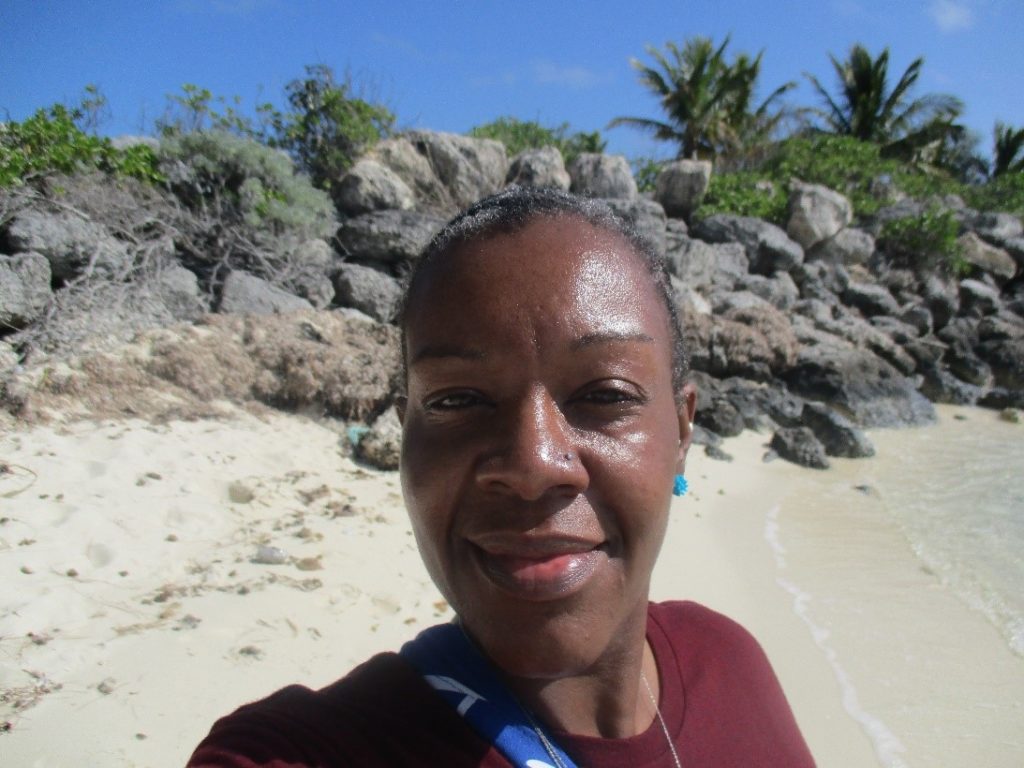
Taino Beach in Grand Bahamas after viewing herb gardens and enjoying an occasional mimosa!
Shayla Woodson will be presenting her work at the 3rd Annual Afro Botany Conference at Hidden Garden this August!
